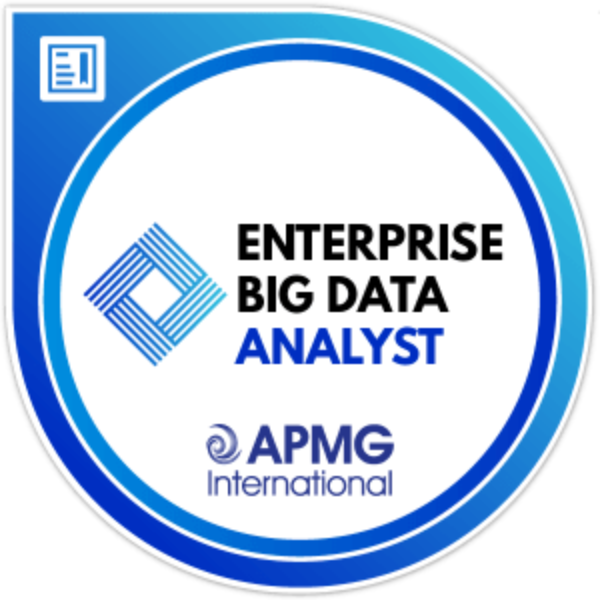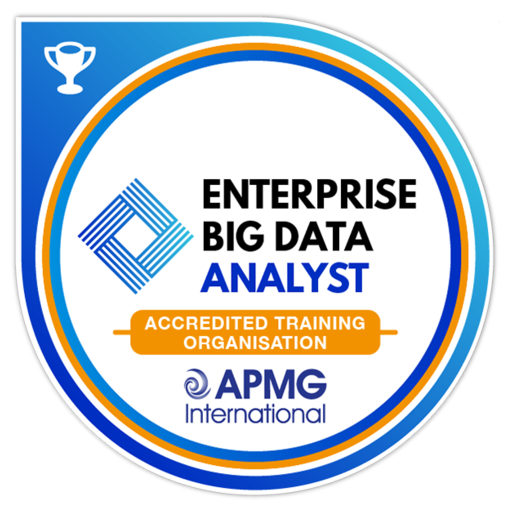The essential skills and knowledge of an Enterprise Big Data Analyst.
Learn the key concepts and theories of Big Data Analysis to its data analysis techniques.

Introduction
The Enterprise Big Data Analyst (EBDA®) course will teach participants advanced Big Data analysis techniques and will guide participants how to build reproductible data analysis models.
Course Duration : 4 Days
The Enterprise Big Data Analyst (EBDA®) course discusses advanced techniques for the analysis of Big Data. In this course, the participants will learn how to obtain value from data through statistical and machine learning techniques and how this analysis should be presented in a reproducible manner. The course discusses advanced data analysis techniques in the context of Big Data. The course provides an overview of the most common algorithms for exploratory data analysis, statistical inference, predictive modelling and machine learning techniques (classification and clustering).
Course participants will learn the underlying theory of the different algorithms, and how each algorithm can be applied in practice in the R programming language. This certification will not test programming skills. The emphasis is on the correct application of the theoretical models. However, participants are required to understand the output of the programming languages in order to draw conclusions from the results of the analysis.
The course is the second level of the Big Data Framework course curriculum and certification program and is globally accredited by APMG-International. The curriculum provides a vendor-neutral and objective understanding of Big Data architectures, technologies and processes.
- Introduction to Big Data Analysis
- The Data Analysis Process
- Data Ingestion – Importing and Reading Data
- Data Preparation – Cleaning and Wrangling Data
- Data Analysis – Model Building
- Classification Techniques
- Clustering Techniques
- Outlier Detection
- Data Presentation
This Enterprise Big Data Analyst course will prepare participants to:
- Understand and explain the data analysis process
- Understand the difference and structure of common data sources
- Apply and utilize fundamental data cleaning and wrangling operations
- Understand and apply exploratory data analysis techniques
- Understand and apply the core concepts of statistical inference
- Formulate and interpret predictive models
- Formulate and interpret machine learning models for classification and clustering
- Formulate and interpret outlier detection models
- Understand and apply the core data presentation techniques
This qualification is aimed at individuals who are involved in enterprise Big Data analysis, who require a working knowledge of the principles behind Big Data analysis techniques, and who need to know the different statistical and machine learning techniques to make the right decisions:
- Data Analysts
- Business Analysts
- Business Data Analysts
- Systems Analysts
- Data Management Analysts
- Business Analytics
- Consultants
- Data Scientists
- Data Modellers
Successfully passing (65%) the 150-minute examination, consisting of 80 complex multiple-choice questions, leads to the Enterprise Big Data Analyst (EBDA) Certificate. The examination and certification process is administered by APMG International on behalf of the Enterprise Big Data Framework Alliance.
Upon passing the exam, participants will obtain the Enterprise Big Data Analyst (EBDA®) certificate, that is globally accredited by APMG International.
The Enterprise Big Data Analyst is an advanced level course, that will require experience in the analysis of data and common data operations techniques. The Enterprise Big Data Professional level is a mandatory prerequisite. Programming experience is an advantage.
Why Us?
Complimentary refresher
Participants can attend a complimentary refresher if they wish(1-year validity and subject to approval)
Post-training support
Should you have questions after the course, you may contact the trainer for assistance regarding course material
E-learning Portal Access
1 year access to our E-learning portal. Including: - E-books available for download - Official sample exam - Randomised quiz formulated by Sapience Trainers based on past examinations
Meet Your Trainer
Principal Consultant
Sapience Consulting
Principal Consultant
Sapience Consulting
Consultant
Sapience Consulting
Senior Consultant
Sapience Consulting







